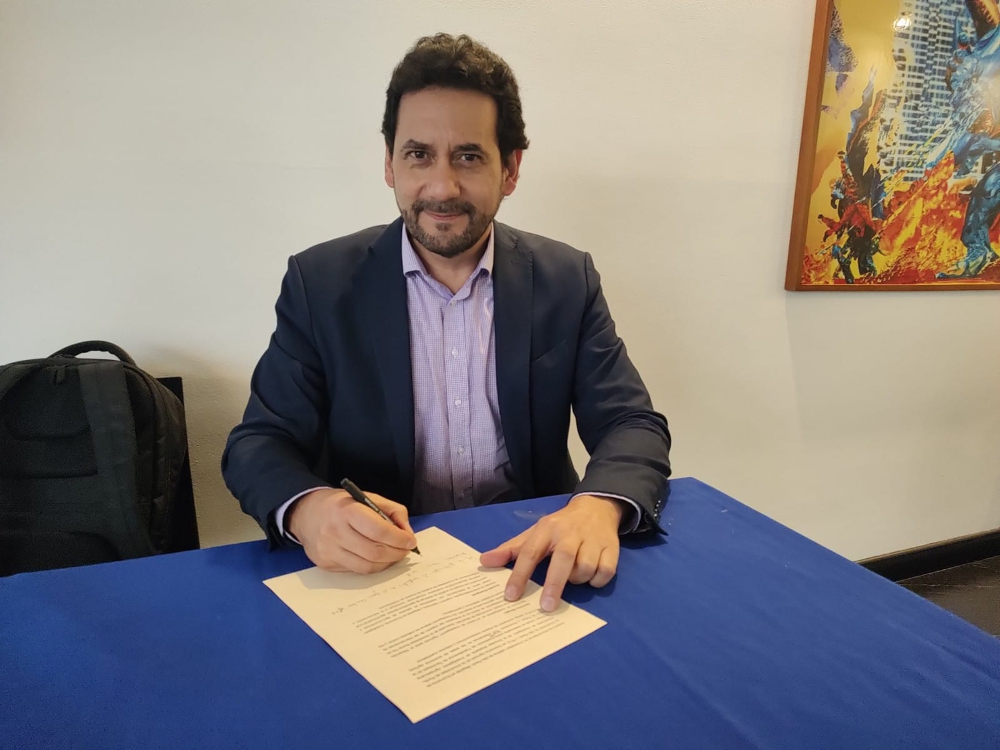- Binational agricultural research
Mosquera, Cundinamarca. May 31, 2023. Corporación colombiana de investigación agropecuaria -AGROSAVIA- and Instituto Dominicano of Investigaciones Agropecuarias and Forestales -IDIAF- signed a binational memorandum of understanding to promote the development of joint projects under eight common areas of interest and fifteen mechanisms to be carried out in academic, research, knowledge, agricultural research and innovation fields, and linkage with society, which contribute to the sustainable development of the Colombian and Dominican agricultural sector.
The interest in making this alliance official is due to the vast resemblance of our ecosystems, which belong to the same biomes, and the similarity of the strengths and weaknesses of our agricultural production matrices.
Víctor Camilo Pulido, an M.Sc. Researcher at the Tunja office in charge of promoting relations with the IDIAF of the Dominican Republic mentioned, "It was typical to find productive systems and problems in common, ranging from tropical fruit crops (cocoa, passion flower —passion fruit or chinola, for example,— cashew, marañón or cajuil, avocado, citrus —orange, lemon, tangerine,— papaya or lechosa, among others), through medium and cold climate fruit trees (strawberries, for example), to perennial crops (forestry, coffee, for example), transitory (sugar cane, rice, cotton, for example) and livestock systems (cattle, goat farming, for example) and their forages (pastures, legumes, among others), on issues such as integrated crop management, integrated pest management, and bioeconomy, among others."
The following eight common thematic work areas were prioritized to put into practice the first efforts from the signing of the memorandum:
- Food security with a family farming approach.
- Leguminous forages for goat and cattle feeding.
- Industrial cassava production: seeds, varieties and drying technologies.
- Production of clean seeds in forest species, potato, and promising cocoa clones (somatic embryogenesis).
- Organic production with small vegetable farmers.
- Banana postharvest (modified atmospheres).
- FocR4T in Musaceae (which already has a technical cooperation project).
- In situ and in vitro conservation of high-quality local germplasm.
However, these issues are not unique because, for example, conversations have already been carried out to exchange knowledge on species such as robusta coffee.
Thus, this memorandum is of utmost importance because it institutionalizes, specifies, and commits the topics and mechanisms of the alliance to generate binational improvements in our agricultural production matrices through:
- Formulating and jointly developing research, development, and innovation projects to access funding opportunities.
- Innovation and technology transfer.
- Strengthening social appropriation of knowledge and technology transfer that generates links with regional actors for knowledge exchange.
- Cooperation for efficiently using capacities in physical infrastructure, services, and research teams.
- Training and education of the institutions' human talent.
- Mobility of knowledge and researchers to strengthen human capital.
- Linking AGROSAVIA's technological offer, consisting of bioproducts, plant material, and laboratory services, among others.
- Joint publications.
- Exchange of institutional reports, information, and technical-scientific material.
- Joint organization of workshops, seminars, and other research and bridging meetings.
- Technical cooperation understood as consultancies and knowledge exchange.
- Referencing and strengthening institutional capacities through exchanging good practices, procedures, and operating models, among others.
- Use of laboratory capacities and infrastructure of both parties.
- Production and processing activities of agricultural products.
- Support activities that promote agricultural sector product marketing.
For the researcher Pulido, "With the ease of this memorandum, the projects that can be worked on at a supra-institutional level become more expeditious, formal, and traceable. In this way, by signing this memorandum of understanding, we expect that the institutions of each country will exchange knowledge and efforts to promote sustainable agricultural production and responsible consumption."
It is pertinent to point out that before this memorandum, the work between both institutions had been directed from the efforts of the researchers, who already saw this alliance as relevant in light of their topics. For example, the Regional Platform for Sustainable Livestock Innovation, led by the corporation in 2015, with the IDIAF in the Dominican Republic and INTA in Costa Rica as allies, showed the relevance, reliability, and goodness of these alliances for small- and medium-sized producers who are committed to sustainable silvopastoral systems. This platform achieved static livestock diagnostics, serving as a preliminary snapshot of the systems' sustainability. Moreover, the Technical Cooperation Agreement No. 2062-03 about Fusarium oxysporum RT4 in Musaceae is a case of success from the alliance of these institutions, plus others from Latin America. This alliance is encouraged to expand to other mutually beneficial issues between the institutions of the Dominican Republic and Colombia. At the country level, the RD 75-11 sugarcane variety for the production of panela, native to this island nation and introduced to Colombia more than 30 years ago, is a successful technology offer for the country and the Corporation, which proves that both the Dominican Republic and its public research institutions, especially the main one, can provide knowledge, methods or valuable materials for Colombia, and vice versa.
- More information here:
- María Elena Londoño Rubio
- Communications, Identity and Corporate Relations Professional
- Research Center Tibaitatá
- Communications, Identity and Corporate Relations Advisory Office
- melondono@agrosavia.co
- AGROSAVIA





